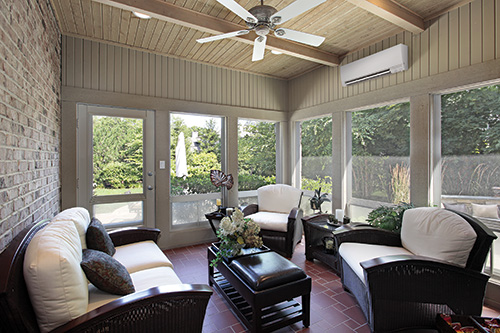
Looking at ways to stay cool during the summer while saving money is important. Following a few tips can make this process much easier. You will have more money left over while still staying cool and comfortable in your home. Here are ten tips on how to keep your house feeling comfortable while saving you money.
1. Schedule Regular HVAC Maintenance
Regular maintenance of your HVAC system is crucial for its optimal functioning. A professional technician can provide an annual check-up that will ensure that your system is performing at its most efficient level and can help prevent costly repairs in the future. They will inspect components such as the condenser, evaporator coils, and air filters, ensuring they are clean and functioning well.
2. Keep Your AC Unit in the Shade
If your outdoor AC unit is situated in direct sunlight, it must work harder and use more energy to cool your home. By creating shade for your AC unit with landscaping or an awning, you can improve its efficiency by up to 10%. This will keep the surrounding air cooler, helping your AC to cool the air more efficiently.
3. Use Ceiling Fans to Circulate Air
Ceiling fans can make a room feel up to four degrees cooler by circulating cool air throughout the room. The wind-chill effect they create can make the room feel more comfortable without needing to lower your thermostat. This doesn’t mean your room is cooler – it just feels that way. So, remember to switch them off when you leave the room to conserve energy.
4. Install a Programmable Thermostat
Investing in a programmable thermostat can automate temperature adjustments in your home, saving you energy. You can program it to increase the temperature when you’re at work or asleep and cool down the house before you wake up or return home. A programmable thermostat prevents your HVAC system from working hard when it’s not necessary, and it can limit wear and tear on the system.
5. Insulate Your Home Properly
A properly insulated home is essential for keeping cool air inside and hot air outside. It is important to insulate attics, walls, and floors over unconditioned spaces like basements and garages. Sealing air leaks with weatherstripping around doors and windows can also make a big difference by preventing cool air from escaping your house.
6. Use Window Treatments to Block Heat
Sunlight streaming through your windows can significantly heat up your home. By using blinds, shades, or drapes, you can block the sun’s rays and keep your rooms cooler. This will help reduce the workload on your HVAC system by conserving energy. In addition, consider investing in energy-efficient windows or window films that reflect heat.
7. Update Your HVAC System
If your HVAC system is over ten years old, consider upgrading to a more energy-efficient model. Newer HVAC systems are designed to operate more efficiently, reducing your energy consumption and potentially saving you hundreds of dollars in the long run. While the upfront cost may seem steep, the energy savings can pay for the new system over time.
8. Keep Vents and Registers Clear
Ensure that your supply and return air vents are free of obstructions like furniture, rugs, or drapes. Blocked vents can reduce airflow, causing your HVAC system to work harder and consume more energy. Make sure to check all the rooms in your home, even those that are infrequently used, to ensure a more efficient and consistent temperature throughout.
9. Maintain an Optimal Temperature
It’s important to set your thermostat as high as comfortably possible during the summer. Even small changes can help you save money on your electric bill. As a guideline, the Department of Energy recommends setting your thermostat to 78 degrees Fahrenheit while you’re at home and need cooling. Even a few degrees of difference can lead to significant energy savings.
10. Limit Heat-Producing Activities
Limiting activities that generate a lot of heat, like running the dishwasher, oven, or dryer, in the early morning or late evening when it’s cooler outside can help keep your home cooler. This will reduce the amount of work your AC needs to do to cool down your home, which saves energy. Cooking outdoors, air-drying dishes, and using a clothesline can also help reduce indoor heat.
Heatwave Heating & Cooling offers HVAC services for customers in Amherst and the surrounding areas. We also provide ductless system repair, indoor air quality services, and tankless water heater installation. Feel free to give Heatwave Heating & Cooling a call to learn more about using our services.

